Chris Baty's Blog, page 235
June 26, 2012
The Joy of Validation

For my major in college, I ended up spending a lot of time in writing workshops. These classes, their professors, and the students involved all tended to be…provocative. There was the professor who shared a name with a 90’s hip hop duo, and went on at length about majesty of falcons. There was the workshop where we were asked to stand up, one by one, and offer up our most penetrating insight into a peer’s work, intervention style (Note: this does not for a comfortable class make).
But one of the perks of being in a workshop is that they’re almost always made up of pretty interesting folk. Now, interesting can lean towards good or bad. You can learn from both, but taking a lesson from the bad (telling yourself, “Oh, right. That’s why I shouldn’t do that”) is uniquely satisfying. There should be a German word for it. Which brings me to my classmate, Beowulf (name changed, privacy’s sake, etc.)(Because it was a celeb!)
(Just kidding, it wasn’t, but that would’ve been cool, too.)
Beowulf seemed to be one of those people who had everything going for them. Confidence oozing from pores so thick, you could see streaks of it on everything he or she touched. A couple of weeks into the semester, when we were all to read our work for the class, Beowulf leaned back when it came to his or her turn, steepled fingers, and said, “I’ll pass. I don’t feel the need to be validated by my peers.”
Bam!
It still makes me smile. On the one hand, I’m a little awed by Beowulf’s unerring self-certainty. On the other, I think there was a point missed there somewhere. Writing can be solitary work, and there are a ton of anxieties that come from doing it alone, including worries about tunnel vision, inability to finish, and more (right? Am I alone here? Voila, writerly insecurity, take a bow!).
Workshops are great for testing out a more finished version of your product, but NaNoWriMo feels like an in media res workshop, if that makes sense. One of my favorite things about Camp NaNoWriMo is knowing that I’m not working in a vacuum, that there are people in my cabin who can see my progress, and will either nudge me to get to typing, or congratulate me on my word count.
I can go to the forums, and ask for plot ideas, or to see if there’s anyone who’s an expert in medieval monster lore. I love that at the end of my first draft, I can submit my novel, and share in a feeling of accomplishment with writers from all around the world.
Sure, I might not need to be validated by my peers, but there’s a joy in sharing well-earned accomplishments, in being able to take a break after banging out a first draft, and allowing yourself to be patted on the back. “You did good work. You persevered in taking on a monumental task. You pushed yourself. We’re proud of you.” Who wouldn’t want to hear that?
It’s why I’m the number-one fan of the phrasing of that link on our Edit Novel page. The Camp NaNoWriMo challenge doesn’t come to a stop after you type “The End” in the privacy of your own document. There’s another step to come, a community to share your accomplishment with, one more link to click:
“I am ready to validate my novel.”
Have you already gotten a winner’s badge, or are you on your way? How sweet does victory taste?
— Tim
Photo by Flickr user ~Zoe~
June 22, 2012
The OLL-iverse: Starlog 3
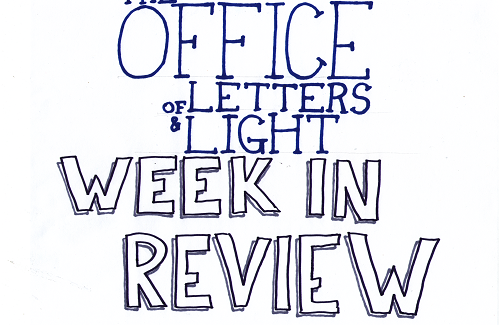
And we are back with another inspiring edition of your catch-all review of all the wild and exciting things that happened around the world of Letters and Light this week!
Today’s post is brought to you by Ben, who is not actually in the office today. He is off paddling his car into the sunset.
Camp NaNo:
Sarah sent you a Week Three pep talk, reminding you to focus on the awesome parts of life and camping.
Winning starts in MERE HOURS for some of you, and in MERE DAYS for the rest of you! Lindsey has some important reminders to make sure you’re ready to rock.
On Facebook and the Forums:
What’s the weirdest thing you googled while doing novel research today? I was looking up obscure 14th century blood diseases.
On Facebook, we want to know what you think happens when everyone is out of the office!
In the Office:
On Wednesday a WriMo dropped by the office and brought us pie! How cool is that? We love it when you guys come by and say hi.
We also had cake on Wednesday. It was a pretty intense day for baked goods.
Yesterday was Mrs. Dalloway day. Shelby wants you to know that she did indeed buy the flowers herself.
That’s all that was going on this week for us! It was a fun week, and we kept pretty busy. We’re eager for you guys to start pushing your word counts over the top this weekend! Good luck, everyone!
Of Books, Planes, and Halibut
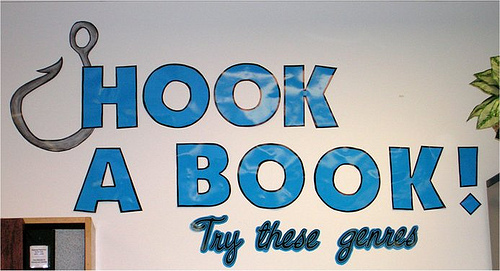
I am doing a lot of traveling this summer. Between now and August, I will find myself in Maryland, Georgia, Florida, Virginia, Vermont, and Alaska. (I’m serious about the “finding myself” part; a man comes to a lot of realizations while fishing for Alaskan halibut, or so I understand.)
I’m currently packing for the longest stretch (three weeks!), and in addition to finding that I don’t have enough T-shirts that aren’t NaNoWriMo-branded, I’m struggling to figure out my reading situation. How many books does one pack for such a trip? Should they be the breezy sort that are custom-made for airport layovers, or the heavier tomes that I’ll have no excuse to keep avoiding? These are my conundrums.
I should add that traveling time is among my favorite times to read. I find that one of life’s great pleasures is starting a book at the beginning of a flight and finishing it just moments before touchdown. (This most recently happened with The Karaoke Singer’s Guide to Self-Defense, a flawed book made better by perfect timing.) And I haven’t even mentioned the all-important beach/hammock/fishing boat reading I plan to do.
What are your travel reading strategies or superstitions? Do you pack more than you need? Just rely on your e-reader? Buy something at the airport? What kinds of books?
Also, can someone tell me why this halibut fishing manual costs $1,000?
— Chris
Photo by Flickr user Enokson
June 21, 2012
Sometimes You Need to Paddle a Car

Yes, that is a picture of me paddling my car into the ocean, or at least trying to. Where did I get the paddle? Oh, I keep it in my car. See, it’s one of my Adventure Totems.
Now what the devil is an Adventure Totem!? Well, some of you may have encountered Writing Totems before; you know, a magic little trinket you put on that inspires you to write, that you build up a good writing association with.
Well, I do the same thing, but for adventures. Maybe it’s going hiking at a lake at 2 a.m., or exploring old coastal ruins in the fog, or maybe it’s heading down to the Maker Faire at a moment’s notice. I like adventures! I’m prone to kidnapping my friends and spiriting them off to goodness-knows-where. It usually ends well. Usually. “What does an Adventure Totem look like?” you might ask.
In my experience, it pays to have a few of them around, especially in one’s car. Various Totems have come and gone over the years, but here’s what I’ve currently got riding around with me:
Paddle: My most beloved and useful Adventure Totem. A machete for bushwhacking, a walking stick for hiking, a weapon for zombie-fighting, and, of course, a paddle for when I get stuck in traffic.
Small Human Skull: Where did this even come from? Useful for set-dressing when making giant spiderwebs, and/or bartering to trolls.
Combo Compass/Sextant: Perhaps less useful in the days of GPS, but nonetheless comforting to have on hand. Also, it’s very shiny.
Bag of Binary: It’s a plastic bag filled with zeroes and ones. Excellent for decision-making, hacking, or other forms of analog-digital shenanigans.
Now, how do you know when something is an Adventure Totem? Usually, it will just kind of show up mysteriously. Often it’s something that someone else had lying around. Generally they don’t have an immediately apparent purpose, but sooner or later? You’ll be incredibly glad you have it on hand.
What about you guys? Do you guys have any Adventure Totems? What would go in your dream Adventure Totem Kit?
—Ben
June 20, 2012
When is a Writer a Writer?
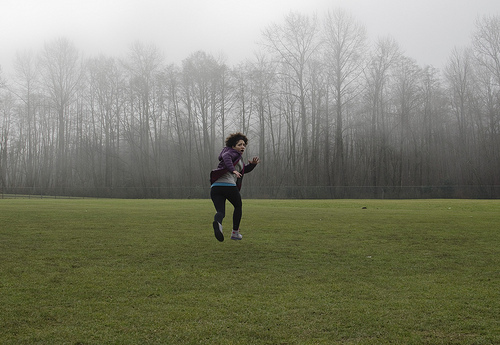
I’m a new runner. I’ve only been at it for a few months, after walking my very first 5K last year. I’m still overweight, so I’m far from fast, and I’m such a rank newbie that I often ask myself whether or not I can actually call myself a runner. I mean, don’t you have to run a marathon to count? Or run five days a week for a certain number of miles?
I have a subscription to Runner’s World. I bought specialty running shoes at a running store after a proper fitting. I am following a 5K training plan, even though I can’t run more than a few minutes at a time. When do I get to call myself a runner?
This insecurity isn’t limited to running. Or to any sport. Writers experience this as well. Every so often, someone will come to the NaNoWriMo forums to ask, “When can I call myself a writer?”
There have been some pretty controversial articles on this subject on the web. Many people feel that you can’t call yourself a writer until you’ve Written a Published Novel. Others think that you have to have something rejected a certain number of times (though no one can seem to agree on the proper number of professional rejections one must accumulate before Writerness adheres to your resume).
I found clarity in a comment to this blog post that asks when you can call yourself a true runner: “A runner is one who runs. If you run at all, you are a runner.”
If you write… you are a writer.
It doesn’t matter if you’re a published author. Or writing crap. It doesn’t matter if it takes you ten years to perfect the Great American Novel, or 30 days to write your someday novel. Neither makes you “more” of a writer than the other! It doesn’t matter if you write blogs, cookbooks, literary fiction, fantasy, romance, or autobiographies. What matters is that you write.
A writer is one who writes!
Often, our critics will tell us that NaNoWriMo promotes the idea that anyone can be a writer. You know what I say to those critics?
Well, duh!
That’s the point. Anyone can be a writer. It’s not about writing the perfect literary novel, or even something that a publisher would ever want. Many of our writers are writing for fun, and never have any intention of publishing their NaNoWriMo novels. I think that’s totally okay!
So the next time someone tries to tell you that you’re not a writer because you haven’t done XYZ, or because you didn’t spend enough time on something you wrote, or didn’t do it to their personal specifications, smile and walk away. You know something magical, and they don’t yet.
I’m a runner, because I run. I’m a writer, because I write.
And that’s all that matters!
Photo by Flickr user savageblackout.
June 19, 2012
A Wrimo's Guide to Noveling Pitfalls and How to Avoid Them

Linda Ge is a Northern Californian high school student by day and a writer by night. A longtime NaNoWriMo participant, she is the co-proprietor of Teens Writing for Teens. She wishes the Wall Street Journal had a horoscope section and would love it if you left a comment or a hundred on the TWFT blog. We were lucky enough to have her spin some wisdom for us on our blog:
At the age of 17, I consider myself a NaNoWriMo veteran. I’ve been participating since the seventh grade, and I’ve won four times (we won’t talk about the times I didn’t quite make it).
For y’all out there who are participating in Camp NaNoWriMo, congratulations! You’re entering into that home stretch. Now making it through the home stretch is mainly about keeping your focus. As a longtime participant, here are some mistakes that I’ve learned to avoid. I hope this helps you, too!
Deleting a good chunk of everything you wrote because, five minutes ago, you decided you wanted to head in a completely new direction.
No! Let’s stop that.
The thing is: you can always revise later. And the whole point of NaNo isn’t to compose 50,000 perfect words; it’s to put 50,000 words on paper. You can’t revise your manuscript if there’s nothing left to revise.
And if you do decide to go through with your changes anyway, you just might regret it tomorrow morning when you realize the brilliant new plot you figured out around midnight isn’t so brilliant after all.
Allowing friends and family to read your novel before it’s done.
The best-case scenario is that they love what you have so far. Flush with praise, all of a sudden, you start to ask yourself what they would want to read about instead of writing the story you’d set out to.
The worst-case scenario is that they don’t “get” it at all and you wallow in your room for a few days before dumping your manuscript altogether.
You’ve heard writers say, “Show, don’t tell.” Well, in this case, it’s better to tell your loved ones about your NaNo novel than to actually show it to them.
Spending writing time doing research or anything that’s sort of writing-related—but isn’t actually writing your novel.
Write your first draft because you love the story, not because you want to get it published. You’ll find that your motivation for writing is stronger. When you’re preoccupied with thoughts of publishing your work, writing time inevitably morphs into make-a-mockup-of-your-book-cover time. Or find-the-best-character-name-that-readers-would-like time. Or look-up-facts-for-accuracy-because-God-forbid-I-slip-up time.
It’s what I call “pseudo-writing”: work that is pertinent enough to your actual goal of finishing the darn book that it leaves you with a feeling of success, but ends up being a time drain.
At the rough draft stage, it doesn’t matter if Andrew Carnegie supported the Social Gospel of Wealth, or if Hitler was assassinated in 1944 by Brad Pitt. Write it in if it works for your story. Fact-checking can come later.
What are some writing mistakes that you’ve made in the past? How have you learned to avoid them?
June 18, 2012
Back In the Saddle...
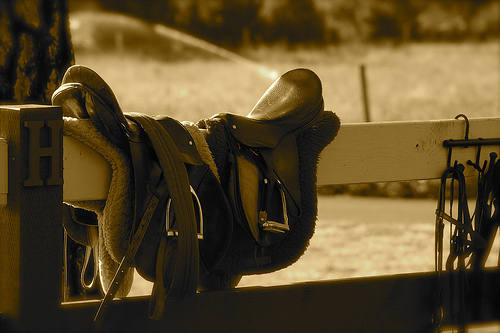
Last week I shared with you my shame and dismay at the uncharacteristic reading drought I was suffering through.
By airing my problem publicly, I was motivated to work harder on the fix (a good example of why we encourage our writers to publicize their goals as motivation to win!). And, my friends, it appears that I am back in the saddle again.
I hit that often-critical 88-page mark, and the book I’ve been chipping away at got good. Really good. And now I’m carrying it with me wherever I go—from upstairs to down, and vice-versa. I was even at risk of being late to work this morning because I couldn’t be bothered to stop reading and get in the danged shower. And I had an epiphany.
In addition to the euphoria I feel at being “into a book” in the old ways of yore, I realized that my reading drought could also be attributed (at least partially) to that 100-page curse.
Do you know about this? Where it takes a good 80-100 pages to get to the meat of a book’s story and characters? What is that?!?! And thank goodness I stuck with it, because the payoff has been spectacular.
I’m not going to delve into a deep pit of ponderance over why authors and their readers must sometimes battle it out over the first fourth of a novel. Instead, I’d love to know what book you’ve read that was well worth the hard work in the beginning. (We can all wear our “I survived the first 100” T-shirts together.)
— Lindsey
Photo by Flickr user eric.surfdude.
June 15, 2012
The OLL-iverse: Starlog 2

Good morning, sports fans, and welcome back to your favorite feature: the weekly recap! Plenty of excitement went down in NaNoland this week, and we’re here to make sure you don’t miss a bit of it. Want to be sure you’re up to date on your swamp things and alligator attacks and priest-strangling noodles? Then this is the post for you!
Today’s list brought to you by Ben, who thinks that writing is still more important than sleep, but sleep is pretty wonderful when you can get it.
Camp NaNo:
Grant looked past the glamour of ‘inspiration’, and praised the hard-working ethos of ‘showing up’ in his Week Two Pep Talk!
We had a fun Wednesday evening chat on Twitter, with campers from all over chiming in with their thoughts and stories.
On Twitter and Facebook:
We were overwhelmed with inspiring post-it note quotes! Now I know where to look next time I’m having any doubts…
You gave us some delightful ideas for this year’s NaNoWriMo stickers!
We got some help from our Twitter followers in renaming the deliciously but poorly-named brownie-muffins, though everyone in the Office seems to have a different favorite. (ED NOTE: Brupcakes for the win!)
On the forums:
Campers have started writing letters to their characters. The trend seems to be toward begging characters to stick to their outlines, but we know how rarely that happens.
Do you have a pen name? Do you prefer to stick to your real name? Chime in over on the pen names discussion thread!
Fun stuff around the net:
June 16th (tomorrow!) is Bloomsday, a celebration of James’ Joyce Ulysses! The Millions has a fun quiz to test your Joyce facts.
That’s what we’ve been up to, in between games of space-hockey and strozzapreti feasts. We’re definitely looking forward to a nice relaxing weekend, though. What about you folks out there? Any exciting plans?
A NaNo Novel About NaNoWriMo: A Q&A With Kim Votry

Kim Votry is a YWP educator, a homeschooling mom, and a writer. On top of all that, she’s a writer who writes about NaNoWriMo! Her upcoming novel, My Own Magic, tells the story of a writing teacher so strange she clearly must be a witch, and the trials and triumphs of her class of twelve-year-old would-be WriMos.
Kim is deep in the thick of a publishing adventure (which you can keep track of on her website over at http://www.myownmagic.com/), but she squeezed in some time to answer a few questions for us.
What inspired you to write a book about, well, writing a book?
As a YWP educator myself, I think the idea for My Own Magic grew from one tiny comment made to me by a parent. She was incredulous that her daughter, who used to avoid anything to do with writing, was now spending every waking moment writing a novel.
Stopping me outside the classroom one day, she asked me, “What on earth are you doing in there?” I laughed and said, “It’s magic,” and that’s where the idea that led to writing Ms. Prosaic’s story came from. Morgan and her friends are based on my own “inner young writer” as well as my students. No single character is based on any single student; they are imaginary characters inspired by my students.
What did the process of writing this novel look like, after the initial inspiration struck?
Once I got the idea to write about a writing teacher whose students think she’s a witch, I sat down to make an outline. I’m usually a “pants-er” when it comes to planning a story (flying by the seat of my pants), so making an outline was new territory.
In this case, it worked like magic: in one sitting, I outlined the story chapter-by-chapter, sometimes including details or dialogue if they came to me. I kept asking myself, What happened next? Then what? Then what? It was a happy surprise, but a natural conclusion, for the book to end up being a story about writing a book. I didn’t actually start out with that intention; it just evolved that way. (If anyone’s interested in seeing that original outline, it’s a free download on the Classroom Resources page of my website.)
Throughout My Own Magic, Morgan winds up reading a number of classic novels. Are there other books you’d recommend for young readers?
I really respect the unique and independent nature of each reader. That is, five kids might rave about a book, while two others will complain they couldn’t get into it. I’ve stopped saying, “Oh, you have to read this …” The classics I mention in My Own Magic were some of the books that influenced me as a young reader and, since they’ve survived as classics, might be appealing to a lot of people.
The best advice I can give is to keep reading until you find something that you like. Use the 10% rule: read at least 10% of a book before you give up on it, and if, after reading 10%, you don’t like it, don’t torture yourself by making yourself finish it (unless it’s assigned reading, of course—then you just have to suffer. In that case, think deeply about why you don’t like the book so you can argue intelligently later).
Once you find something you like, find similar stories and go from there. Some books that appeal to one generation won’t appeal to another, and some books are better read aloud than silently (or vice versa).
To answer your question directly, books I recommend include: the Little House on the Prairie series, the Harry Potter books, Charlie and the Chocolate Factory, Half Magic, and The Secret Garden. My son has re-read the Bartimaeus Trilogy twice, and my daughter loves the Enchanted Forest Chronicles. The Golden Compass, Island of the Blue Dolphins, Inkheart, and, of course, Charlotte’s Web are other favorites.
Your 30 Days to Publication blog has been giving would-be novelists an inside look at the self-publishing process. You’ve still got several days left in the countdown, but what would you say has been the most important lesson you’ve learned so far?
The most important lesson I’ve learned is to just put myself out there. Don’t be afraid to contact friends and family and tell them what you’re doing. Don’t be afraid to connect with people you don’t know, but who may share your interests. Don’t be afraid to email authors you admire and ask for help. The common denominator, and my best advice, is don’t be afraid.
And don’t forget to have fun with it. Even if you have serious aspirations, don’t forget that producing a book is, first and foremost, a creative endeavor. Allow all of it to be creative: the ups and downs, the unexpected glitches, and the unpredictable timing of everything.
What sorts of magic rituals do you use when writing? Do you have any candles or crystals to recommend us?
Just like the saleslady in My Own Magic, I need a window so I can expand my visual perception while I’m writing. The view outside hardly matters, although my personal favorites are views of trees, or ocean. What matters most is the creative tension between my mind and the outside world.
I also love writing by candlelight in the dark. Any color will do; I often pick a candle for its scent more than its color. Oh—and I drink tea, lots of it. My favorite is Trader Joe’s Jasmine Green Tea.
So, assuming using dark magic to steal ideas from the minds of children is out of the question, where do your ideas come from?
Isn’t that a great question? Where do our ideas come from? Do you ever use the “show invisibles” function on the drop-down View menu of a word processing document? When you select “show invisibles,” you see a little blue dot for every time you pressed the space bar, a paragraph symbol for every return key, and a line showing where you’ve inserted a page break.
Sometimes I imagine ideas are like that: they’re invisible dots in between everything and around us all the time. Most people don’t notice them, but writers are trained to look for them. I sometimes hear a snippet of conversation, or see a scene in the street as I drive by, or even mishear or misinterpret a piece of dialogue, and my mind leaps up to make something of it.
Maybe it’s enough to spark a whole novel, like that comment made by a parent, or maybe it adds something new and vibrant to a scene. My advice to young writers is: Observe the world and pay attention. Everything is potential story material!
June 14, 2012
Strangle the Priest! (And Other Strange Food Names)
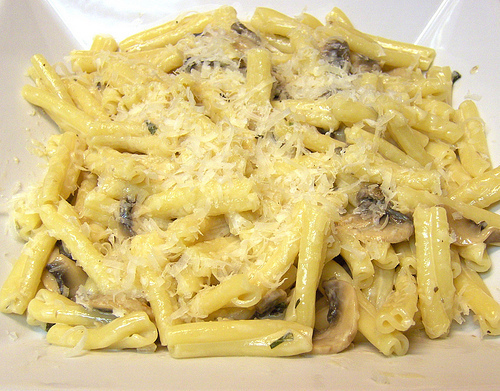 Yesterday morning, I brought some pastries into the office, a hybrid of brownies and muffins. Unsure of what to call them, we turned to Twitter, and you guys gave us some great—and some not so great—suggestions (Mownies? Brupcakes? I personally liked Amazingness from a Higher Power, because it implies I’m some sort of deity).
Yesterday morning, I brought some pastries into the office, a hybrid of brownies and muffins. Unsure of what to call them, we turned to Twitter, and you guys gave us some great—and some not so great—suggestions (Mownies? Brupcakes? I personally liked Amazingness from a Higher Power, because it implies I’m some sort of deity).
Strozzapreti is one of my favorite types of pasta, and has been for many years. Not just because it’s delicious but because of the story of its own unique name.
Strozzapreti is Italian for “priest strangler.” Tada! Now, that’s a pretty weird name for a delicious pasta, if you ask me. There are a few different stories behind the name, but my favorite is one I heard years ago, while traveling in Northern Italy…
Way back when, Italy was full of wandering priests. They would stop into small provincial villages, and when they did, they always expected an enormous welcoming feast. The villages were obligated to provide such a meal, but they weren’t terribly happy about it. Tensions were running high between the clergy and the laypeople.
The townsfolk were especially loathe to serve the priests any meat, because meat was a rare and vital commodity in those days. The cooks had a plan, though. In a traditional Italian meal, the pasta course comes well before the meat course. The pastamakers crafted a pasta that looked similar to penne, a generally lighter-weight type, but in truth was made from much thicker stuff. The priests would gorge themselves on the delicious pasta, only to find themselves much more full than expected—too full to eat much meat! With the priest successfully strangled, the townsfolk could keep their most precious foodstuff.
Now, how true is that story? I have absolutely no idea. But it’s hilarious, isn’t it?
Oh, and because it’d feel rude not to include it, here’s my favorite quick and easy strozzapreti recipe:
1 pound strozzapreti
1 cup heavy cream
2 eggs
1/2 cup parmesan
1/2 cup chopped mushrooms
1/2 an onion, chopped
1/4 cup peas
First, mix together the eggs and cream. Grate the parmesan. Mix half of the cheese into the cream sauce, and set half aside.
Sauté the mushrooms and onions together in vegetable oil. Cook until the onions are just translucent and browning.
Boil the strozzapreti according to the directions on the packaging, but remove from heat just before it’s finished. Strain the strozzapreti, but keep the pot on the stove, over a low heat. Pour the now-waterless strozzapreti back in the pot, and quickly add the onions, mushrooms, peas, and sauce.
Mix together thoroughly, and add the remaining cheese. Remove from heat after a minute of stirring, when sauce becomes thick and eggy.
Serve hot. Enjoy gleefully, then get back to writing!
The stories behind names, whether they’re of people or foods, can be a wonderful place to find inspiration for your novel. I’m giving myself away as a Linguistics major here, but I have a serious love for etymology. The next time you’re stumped by your plot, try looking up some etymological history!
Do you know where your main character’s name originally comes from? What about your villain’s name? Or, heck, what about your favorite food?
— Ben
Photo by Flickr user rdpeyton.
Chris Baty's Blog
- Chris Baty's profile
- 62 followers



